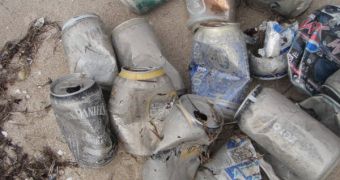There are those people who, despite all pieces of evidence pointing to the contrary, continue to claim that human-caused pollution plays no role in the global warming of our planet, and that wildlife on the ground and in the water is affected more by natural causes than by human activities. But about 400,000 Coastal Cleanup Day volunteers could probably seek to disagree with them, and call these individuals liars, which would, indeed, be their most accurate description.
On a single day in September 2008, large masses of volunteers took part in the 23rd International Coastal Cleanup event, organized by the Ocean Conservancy group. River beds, lakes, seashores and ocean bottoms were all trawled and cleaned, and more than 7 million pounds (3.17 million kilograms) of debris were collected and then disposed of in the proper manner. It would certainly seem that some have, indeed, no common sense in regards to the environment.
This type of actions is no longer a matter of fighting pollution or global warming, but rather addresses the way these individuals have been raised by their families. They have been probably inoculated since birth with the idea that they do not have to answer for their actions, and the results of that education are visible now, unfortunately for those who actually try to make a difference and have learned that the trash goes in the bin, and not on the beach.
Among the most common items found in waters, volunteers identified 3.2 million cigarette butts, 1.4 million plastic bags, 942,000 food wrappers and containers, 937,000 caps and lids, as well as 26,585 tires. These last objects degrade over hundreds of years and have the capacity to pollute large amounts of water. The number found last year is enough to equip 6,646 cars, which should give you an approximation of how many there were. And keep in mind that not all beaches and waters in the world were cleaned, but only some of the major ones. So the real figures are infinitely higher.
“Our ocean is sick, and our actions have made it so. The evidence turns up every day in dead and injured marine life, littered beaches that discourage tourists, and choked ocean ecosystems,” Ocean Conservancy's President and CEO Vikki Spruill concludes.

 14 DAY TRIAL //
14 DAY TRIAL //